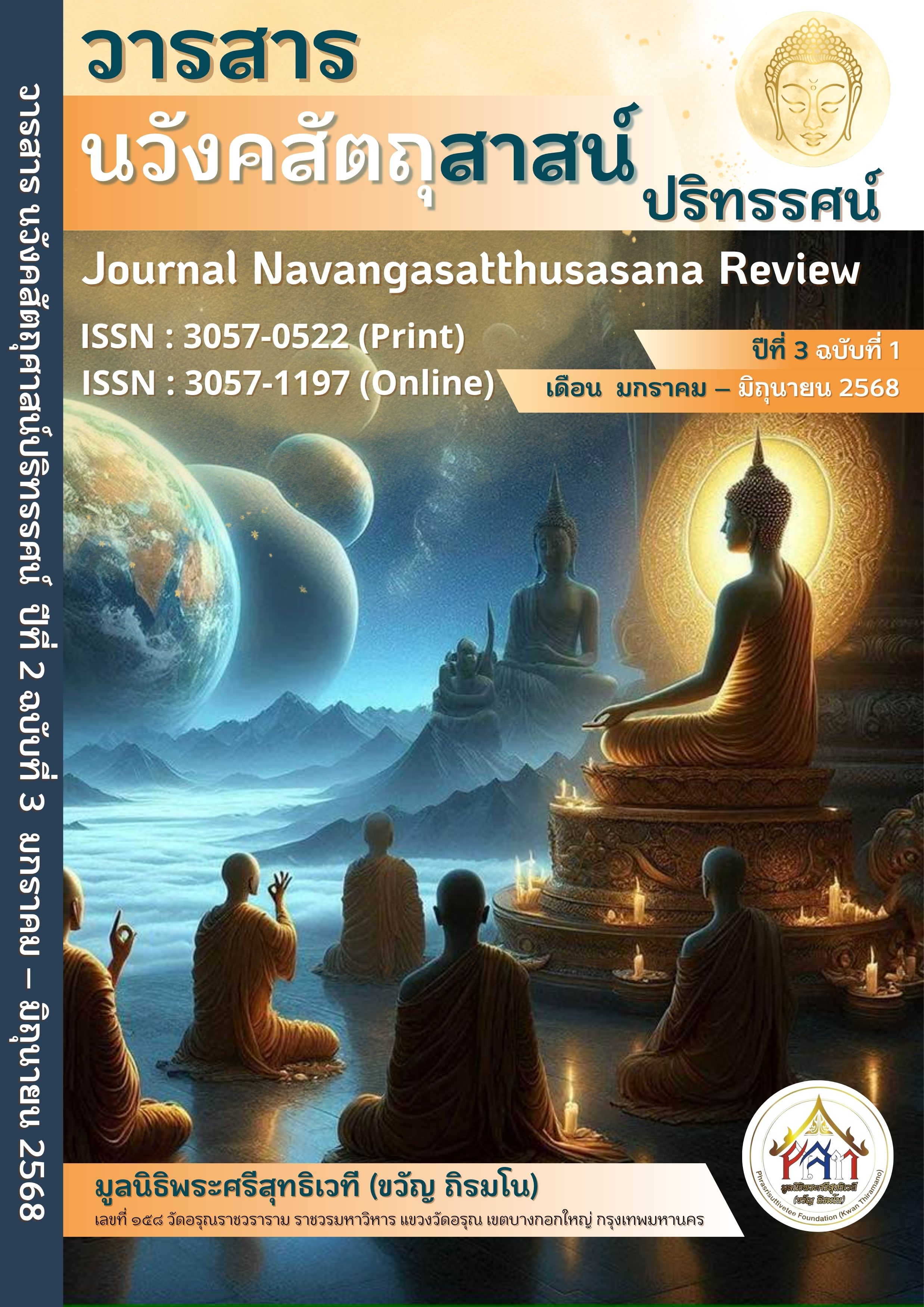Mental Development in the VUCA World According to the Principles of Three Characteristics
Main Article Content
Abstract
The purpose of this academic article is to demonstrate that the environment in the current world has advanced in many aspects with technology. However, if we observe only from the outside, the internal world of humans still has basic needs related to mental illnesses such as greed, anger, ignorance, and endless desires. This can be explained by the concept of the VUCA World (Volatile, Uncertain, Complex, and Ambiguous) which describes the current state of the world. When we know the cause that has directly affected the minds of people in society today. Especially the mental side which is an important foundation for living as a human being. When the process of following the principles of the Three Characteristics in Buddhism is explained, which are impermanence, which is impermanence, dukkha, which is suffering, and anattā, which is non-self. When applying these principles to the cultivation of the mind, it can effectively transform the meaning of the VUCA (Volatility, Uncertainty, Complexity, Ambiguity) world from a crisis into an opportunity. This can bring about significant benefits for oneself and others going forward.
Article Details

This work is licensed under a Creative Commons Attribution-NonCommercial-NoDerivatives 4.0 International License.
เนื้อหาและข้อมูลในบทความที่ลงตีพิมพ์ในวารสาร นวังคสัตถุสาสน์ปริทรรศน์ถือเป็นข้อคิดเห็นและความรับผิดชอบของผู้เขียนบทความโดยตรงซึ่งกองบรรณาธิการวารสาร ไม่จำเป็นต้องเห็นด้วย หรือร่วมรับผิดชอบใด ๆ บทความ ข้อมูล เนื้อหา รูปภาพ ฯลฯ ที่ได้รับการตีพิมพ์ในวารสาร นวังคสัตถุสาสน์ปริทรรศน์ถือเป็นลิขสิทธิ์ของวารสาร นวังคสัตถุสาสน์ปริทรรศน์หากบุคคลหรือหน่วยงานใดต้องการนำทั้งหมดหรือส่วนหนึ่งส่วนใดไปเผยแพร่ต่อหรือเพื่อกระทำการใด ๆ จะต้องได้รับอนุญาตเป็นลายลักอักษรจากวารสาร นวังคสัตถุสาสน์ปริทรรศน์ก่อนเท่านั้น
References
นันทพล โรจนโกศล, “การศึกษาวิเคราะห์แนวคิดเรื่องขันธ์ 5 กับการบรรลุธรรมในพระพุทธศาสนาเถรวาท”, วิทยานิพนธ์พุทธศาสตร์มหาบัณฑิต, บัณฑิตวิทยาลัย : มหาวิทยาลัยมหาจุฬาลงกรณราชวิทยาลัย, 2548.
พระพรหมคุณาภรณ์ (ป.อ. ปยุตฺโต), พจนานุกรมพุทธศาสน์ ฉบับประมวลศัพท์, พิมพ์ครั้งที่ 12,กรุงเทพมหานคร: โรงพิมพ์มหาจุฬาลงกรณราชวิทยาลัย, 2551.
พระมหาสุนันท์ จนฺทโสภโณ (ดิษฐ์สุนนท์), “การศึกษาคำสอนเรื่องไตรลักษณ์ในพระพุทธศาสนาเถรวาท”,วิทยานิพนธ์พุทธศาสตร์มหาบัณฑิต, บัณฑิตวิทยาลัย : มหาวิทยาลัยมหาจุฬาลงกรณราชวิทยาลัย, 2543.
พุทธทาสภิกขุ, คู่มือมนุษย์, กรุงเทพมหานคร : ธรรมสภา, 2501.
มหาจุฬาลงกรณราชวิทยาลัย. พระไตรปิฎกภาษาไทย ฉบับมหาจุฬาลงกรณราชวิทยาลัย. กรุงเทพมหานคร: โรงพิมพ์มหาจุฬาลงกรณราชวิทยาลัย. 2539.
สยาดอภัททันตวิโรจนะ, วิธีเจริญมหาสติปัฏฐาน เล่ม 1, พิมพ์ครั้งที่ 4, (ม.ป.ท.: สำนักพิมพ์ดีเอ็มจี, 2557.
"Who first originated the term VUCA (Volatility, Uncertainty, Complexity and Ambiguity)? - USAHEC Ask Us a Question". usawc.libanswers.com. Retrieved 2021-07-29, [ออนไลน์]แหล่งที่มา: https://en.wikipedia.org/, [5 กรกฎาคม 2566].
VUCA-World, [ออนไลน์]แหล่งที่มา: https://www.sasimasuk.com, [9 ตุลาคม 2566].


